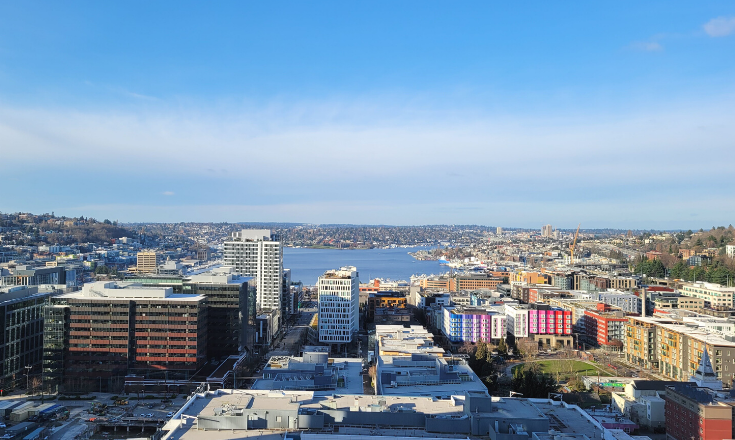In the Oscar winning film Nomadland (2020) directed by Chloé Zhao, the character Fern decided to sell all of her possessions to live in a van and travel the roads of the United States. The film explores the high cost of housing in the United States, insufficient wages and the debts that people accumulate to fulfill their dream home.
Fiction is not too disconnected from reality. A report by Redfin, a real estate company, pointed to a 28.7% year over year average increase in housing rentals in 2022. Apartment List platform says that in Seattle a studio apartment or one bedroom apartment costs between $1,754 to $2,325.
For students not yet in the workforce and studying in Washington’s largest city, Seattle, these statistics are sobering, especially now that classes will go back to being in person or in a hybrid format. Those who chose to live far from school because of online classes and want to come back closer to the city, will need to circumvent high rents.
Seattle Central College Direct-Transfer student Juan Miguel Jocom, who lives in Capitol Hill, has felt the impact of the rent increase despite living in a low-income apartment assisted by the Multifamily Property Tax Exemption (MFTE) program. “The rent has gone up to $150 this year,” Jocom said.
He shares the apartment with two roommates. “We turned the living room into a bedroom to accommodate three people,” he explains. Jocom believes that sharing an apartment and acquiring an MFTE program is an on a budget alternative for those who want to live in the central region. “Without the MFTE the apartment would cost $1,000 more, about $2,900, which the average student cannot afford,” says Jocom, who prefers to live close to the school and optimize travel time.
Early Childhood Education student at North Seattle College, Mariana de Oliveira, lives alone in a studio in Capitol Hill. “When I started looking for an apartment at the end of last year, I found everything very expensive. Some studios, in addition to being very expensive, do not have a structure such as a sink in the kitchen,” she warned. She attended Seattle Central College before moving to North Seattle College.
After much research, she was able to find good prices on Zillow (real estate website) and with the housing program, Oliveira is now able to pay less than $1,000. She has also turned to North Seattle College’s food bank system, to pick up personal hygiene items.She said the program has helped many students to ease their expenses. “It wasn’t just the rent that increased, but the food as well. I feel like everything had a lot of readjustment. It’s an extra concern for a mind that is already very worried about studies,” she remarked.

Johnny Horton, English instructor at Seattle Central College and faculty advisor for The Collegian, has lived in Capitol Hill for over 10 years. He said that renting a one bedroom apartment cost $775 in 2001. Today that amount is more than triple.
“It looks like they[rent increase] have a lot to do with the successful tech companies in town. I remember reading just before the pandemic that Seattle was the third fastest growing city in the United States. I’m not an expert, but it seems like the growing economy in Seattle brought higher rents,” asserted Horton.
And he is right. The region added more than 48,000 tech jobs from 2016 to 2020, an increase of more than 35% — growing at a faster rate than any other large U.S. tech market, conforming to Global Commercial Real Estate Services(CBRE,) a real estate firm. The growth in high-paying job opportunities is reflected in Seattle’s cost of living which is 49% higher than the national average as shown by PayScale’s Cost of Living Calculator.
That’s why today only 1% of apartments in Seattle cost less than $1,000 per month in line with the Apartment List article. Considering one bedroom apartments, the most expensive neighborhoods in Seattle are Seattle Central Business District ($3,511), Pike Place Market ($3,054), and Belltown ($2,669), on the other hand the most affordable neighborhoods are International District ($1,891), Fairmount Park ($1,810), and Olympic Hills ($1,682).
Zillow’s estimates indicate that home prices are growing faster than salaries in 25 of the 38 biggest cities and the Seattle-area ranks 7th on the list. It seems that after the challenge of graduating from college, recent graduates will need to negotiate their salaries very well in order to have all their expenses paid in the budget.











Very informative. I enjoyed this article very much. Good job!